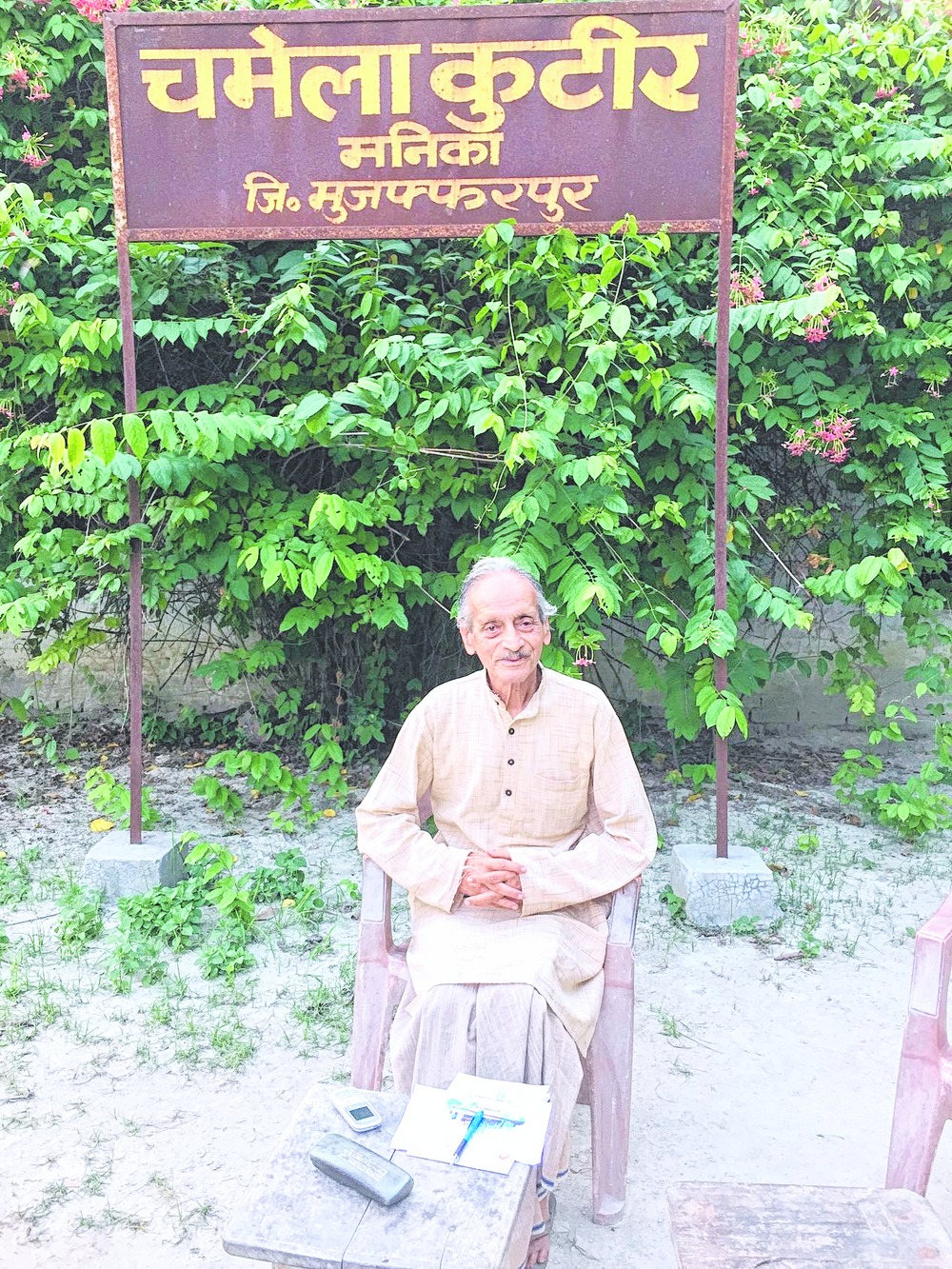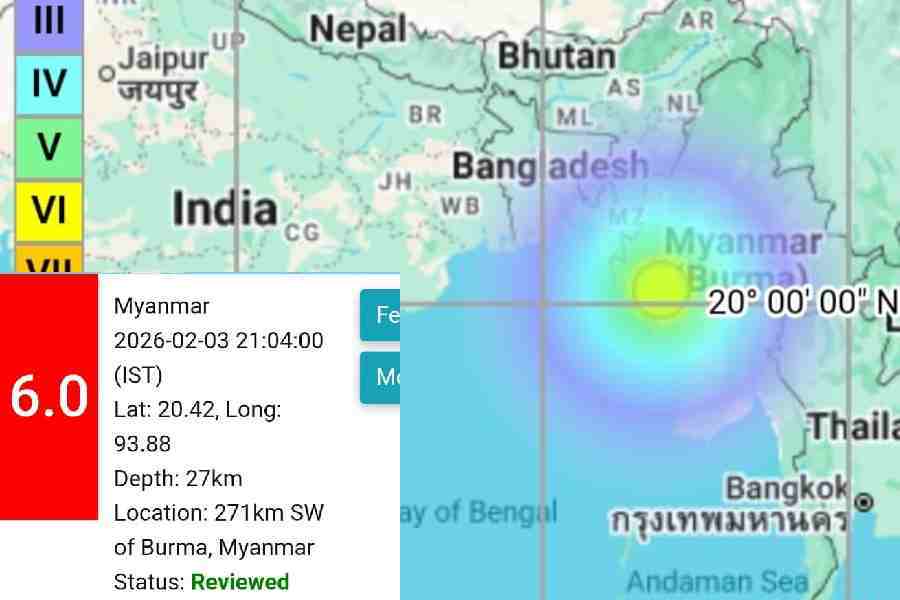
It is a beautiful evening, rain-filled and green. We drive past Muzaffarpur town onto a narrow road, pass groves of bananas, mangoes and lychees, vegetable patches of potatoes, cauliflowers, onions, fields of rice, sugarcane and grass. We cross a canal and suddenly came upon a lake. Its water is red from the setting sun. Birds are flying home. It is idyllic.
I was driving to Manika Gaon in Mushari, the home of Sachchidanand Sinha, who is among the most important living socialist writers and thinkers in India. The road was good, the villages clean and orderly. If only every village in India could be like this, neat and fertile, its prosperity reflected not in ugly electricity-guzzling big malls and shopping complexes but on the branches of its trees and the crop in its fields!
Sachchidanandji was waiting for me with Biju mangoes from his tree, soaking in a small bowl of water. We sat on a raised mud-platform outside his small home, surrounded by mango and guava trees and a flowering madhumalti bush. A tiny patch of wild grass divided us from the main village road, with small houses on both sides.
"Your father had come here during George's (Fernandes) election," he recalls. George's constituency was Muzaffarpur in Bihar though Bombay was his stomping ground as a trade union leader and Mangalore his place of birth.
My father and George were close friends. George had hidden at our place during the Emergency dressed as a priest. At the time of his arrest, my father had gone to fetch Chinese food. Later both my parents had campaigned for George's election in Muzaffarpur, while George was in jail for the Baroda Dynamite Case.
When George came to Calcutta after his release, he took us to eat ice-cream on Park Street. However, in good socialist tradition, I never called him Uncle. He was simply George. My father still goes to see a paralysed George in Delhi, even though they did not meet during the BJP-alliance years.
Sachchidanandji too opposed the Emergency (Emergency in Perspective: Reprieve and Challenge, 1977), but the performance of the Janata regime disappointed him. He reflected on the subject in The Permanent Crisis: After Janata What? (1978), and left Delhi for Bihar in 1979, to live and explore socialist ideology.
The 87-year-old lives on the bank of a huge lake in the middle of exotic flora and fauna, grows his own grain, greens, and fruits. He offers the Biju mango grown without any chemical fertiliser or pesticide with delight. He paints and photographs his surroundings, and has published a book on birds.
As I suck the mango, I talk to him of Gandhian socialism. He explains: the ends don't justify the means; the means are the ends; the means we choose dictate the ends we get. As this has come down to us, it is popularly understood as non-violence.
But it goes far deeper than that. We discuss how violence done to the earth normalises violence for us. In turn we are violent with each other without realising it. Violence to women is part of the culture of violence. Non-violence has to start from non-violence to earth.
How can one be non-violent to the earth? We are not miners, we don't throw bombs, we don't throw chemical into rivers. His answer was, we have to be mindful consumers and mindful producers. Large-scale industrialisation has led to large-scale waste and the very rape of earth. We have to consume as little as necessary. At the same time, we have to choose our means of production carefully. The race for more has devastating environmental consequences.
In fact, Sachchidanandji felt that the biggest issue for the socialist movement was environment and nature. Socialists needed to offer a different paradigm for development.
Born in 1929, Sachchidanand Sinha joined the Quit India movement in 1942 as a Class 9 student and ended up with the socialist group of Dr Ram Manohar Lohia and Kishan Patnaik. He was in the labour movement working as a khalasi (coolie) in Bombay, when Lohia read an article by him. He began working in Mankind; later participated in the JP Movement and has, ever since, contributed to the socialist movement as a writer and ideologue.
In 1973, he wrote The Internal Colony: A Study in Regional Exploitation on Centre-state relations focussing on Bihar, the definitive Socialism and Power, The Bitter Harvest: Agriculture and Economic Crisis called for long-term planning and management of agriculture and environment and Chaos and Creation, a profound probing of the biological roots of art and creativity.
He is able to transcend boundaries of disciplines and ideologies, but returns to socialism, again and again, because he finds in it the only hope for mankind. I wonder why. So many friends in my generation feel that Bihar is poor because socialism has called anarchy here.
He smiles and says they don't see the changes in the everyday lives of ordinary people. They don't see the teenage girl cycling to school in a remote Bihar village who could not have stepped out from home a decade earlier or the change in the caste composition of the Bihar Assembly from the 1950s which was then dominated by Brahmins and Kayasthas. Today the majority is of Yadavs, Kurmis, Majhis, Paswans...
"The change may not be enough but a radical change is happening. Its biggest threat is the so-called development that is being imposed top-down. We are brainwashed into believing that destruction is 'development' by both the communist and capitalist thinkers. Look at the big industries and shopping complexes - do they give back to people as much as they consume or do they end up consuming people instead?
"Vera Zasulich wrote to Marx questioning his unilinear model of development focusing on industry. Capitalist countries in the west did the same thing. Waste, over-production and the use of technology to control the marginalised are the result of this model. The Gandhian model is more appropriate, not just for agrarian, non-industrialised societies like ours, but for the earth itself. We are hurtling towards disaster. Enough will never be enough, we will always want more."
But what about fascism? Is that not the biggest challenge for India? Sachchidanandji differs. "Fascism cannot take root in India for two reasons: the diversity of our country and Gandhian thought. The BJP had to drop their call to remove Article 370 on Kashmir from the Indian Constitution. And Gandhian thought is in our blood now. It will be hard for any party to uproot our political and socially democratic values."
A man in a khadi dhoti waves from the village path across the grass patch. A woman appears on a scootie. The man jumps in on the back seat behind the woman as they drive away. "That is the change," Sachchidanandji says as he waves back. "She is driving. He took a lift. They are both farmers, going to sell their produce in the local village market."
♦ Ruchira Gupta is a feminist campaigner, writer, visiting professor at New York University, adviser to the UN, and founder of Indian anti-sex trafficking organisation Apne Aap Worldwide.










